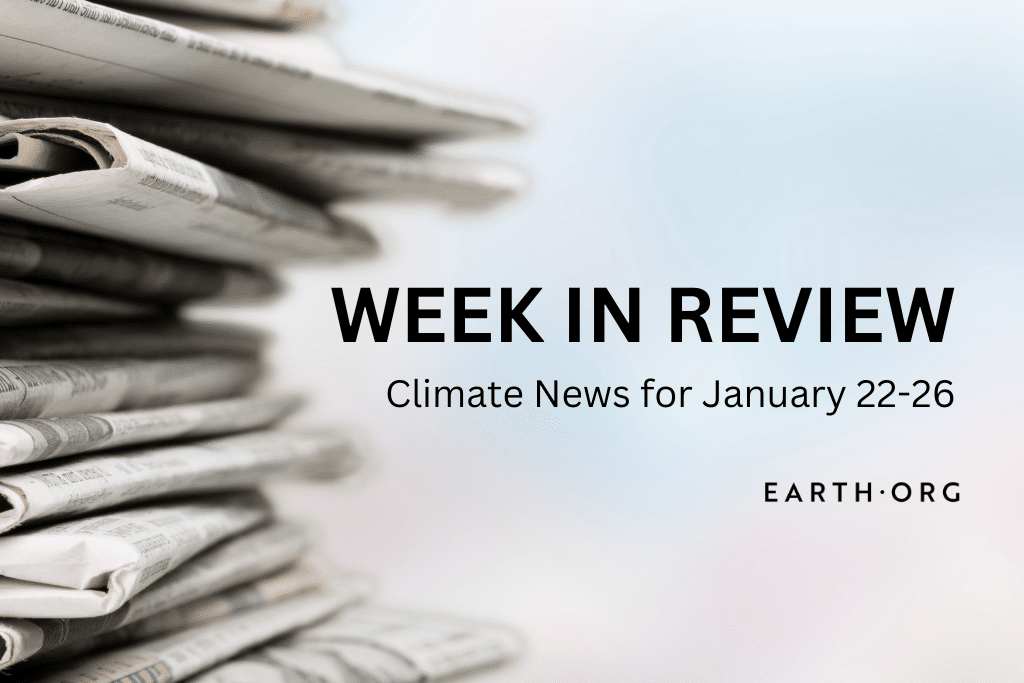This weekly round-up brings you key climate news from the past seven days, including the beginning of the rollout of a vaccine against malaria more than 30 years in the making, a historic fall in fossil fuel emissions in the European Union, and worrying news for Australia’s wildlife.
—
1. World’s First Mass Vaccination Campaign Against Malaria Kicks off in Cameroon
Nearly 30 million jabs developed by British pharmaceutical company GSK will be distributed in up to 12 countries across sub-Saharan Africa as part of a World Health Organization-backed campaign to stop the spread of the disease, which in 2022 infected 249 million people – 16 million more than in 2019 – and claimed 608,000 lives, 95% of them in Africa.
More than 30 years in the making, the RTS,S vaccine has already been rolled out to nearly 2 million children in Ghana, Kenya, and Malawi as part of a promising pilot program that has shown a 30% reduction in deadly symptoms. It is now poised for a broader rollout across the continent, which bears the world’s biggest burden, with Cameroon leading the way. The Central African country is among the ones most affected by the disease globally, with 3 million cases and nearly 4,000 deaths recorded in 2021.
A second vaccine developed by scientists at Oxford university and produced by India’s Serum Institute, which completed a key regulatory step in December, will be rolled out in the coming months, easing fears of a supply squeeze after more than 30 African nations expressed interest in the vaccine.
Read more here.
2. Azerbaijan Adds Women to COP29 Organizational Committee Following Criticism
Azerbaijan has backtracked following a backlash over the appointment of an all-men committee tasked with organizing the upcoming UN climate summit, COP29, which is set to take place in the capital Baku in November.
Last week, Azerbaijan’s president Ilham Aliyev announced the addition of 12 women to the 28-member committee – most of whom are government officials and members of parliament, bringing the total number to 40. On the same day, some 75 women leaders from business and academia issued a letter to Aliyev, urging him to backtrack and ensure “the best minds come together to advance solutions” at the upcoming summit.
Historically, women have always been underrepresented at the UN climate summit, with only five women serving as presidents in 29 years of COPs.
Read more here.
3. EU Fossil Fuel CO2 Emissions Hit 60-Year Low in 2023 Amid Clean Energy Expansion
According to the Centre for Research on Energy and Clean Air’s (CREA) analysis published Wednesday, last year’s levels of annual CO2 emissions from fossil fuels were unseen since the early 1960s. The year-to-year decrease was the 27-bloc’s second-steepest after 2020, a year heavily influenced by Covid-19 lockdowns and restrictions.
The analysis revealed that more than half of the decline – approximately 56% – was attributable to the rapid expansion of renewable energy sources, particularly wind and solar, as well as a rebound in hydropower and nuclear, owing to the prolonged energy crisis sparked by the war in Ukraine, which forced the bloc to lower its reliance on petrostates such as Russia. At the same time, emissions from coal decreased 25% compared to 2022 – half of what they were in 2015, while gas- and oil-related emissions fell by 11% and 2%, respectively.
Read more here.
4. Australia Added Record Number of Wildlife to List of Threatened Species in 2023
A total of 144 animals, plants, and ecological communities were added to the national list of threatened wildlife last year, the highest number since the list was established in 1999 and five times more than the yearly average, according to a new report monitoring nature destruction in the country.
Among the newly-listed threatened animal species are 24 reptiles and crustaceans, respectively, 19 fish, 13 birds, six frogs, three insects, and one earthworm. The list also includes 51 new plants and three ecological communities in southwestern and southeastern Australia. 11 species were uplisted, meaning they are now believed to be even closer to extinction.
The Australian Conservation Foundation (ACF), which is behind the analysis, argues that a combination of climate change-fuelled extreme weather events and government-backed habitat destruction, estimated at around 10,426 hectares (25,800 acres) in 2023, are behind the rising number of new threatened species.
Read more here.
5. Climate Change Is Main Driver of Historic Amazon River Drought, Study Finds
A group of scientists from the World Weather Attribution (WWA) group used published peer-reviewed methods to assess the role of climate change and El Niño in influencing the drought, which is affecting an estimated 30 million people that rely on the river for transport, food, and power. They found that climate change-driven high temperatures were the main driver of the historic drought – a 1 in 100 year event on the Standardized Precipitation Index (SPI). On the other hand, the El Niño – a phenomenon that warms the Pacific Ocean and historically a driver of drought – had a “much smaller influence.”
Parts of the Amazon River, the largest river by volume and the second-longest in the world, currently in its dry season, have been drying up at a rate of 30 centimetres (11.8in) per day since mid-September. By the end of the month, the river stood at 16.4 metres (54 feet), about six metres (20 feet) below its level in the same period last year, leaving entire communities stranded and struggling to access vital resources including fuel, food, and water.
Read more here.

















